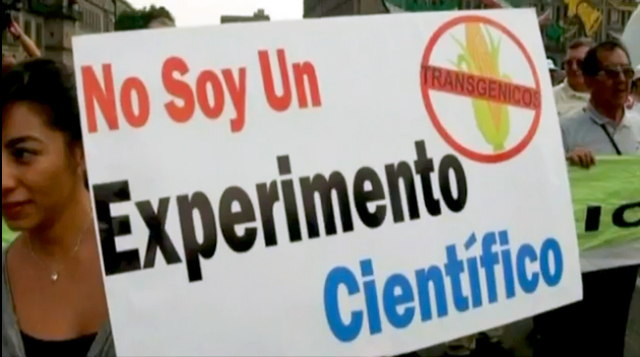On Tuesday a Mexican Federal Appeal Court court headed by Judge Benjamín Soto Sánchez notified Mexico’s Secretary of Agriculture (SAGARPA) that they are not allowed to grant release or cultivation permissions for GM Maize in the country.

In August 2015 Mexico’s XII District Court overturned a 2013 ruling that prevented biotech companies, including Monsanto and Syngenta, planting genetically modified (GM) maize in Mexico. However, Tuesday’s appeal against the August ruling was successful and the ban on GM Maize in Mexico will now continue at least until the end of the full trial.
Judge Sanchez’s ruling supported the original unprecedented ban on GM Maize that was granted in October 2013 by the Twelfth Federal District Court for Civil Matters of Mexico City. Judge Jaime Eduardo Verdugo J. cited “the risk of imminent harm to the environment” as the basis for the decision.
The Judge’s ruling also ruled that multinationals like Monsanto and Pioneer were banned from the release of transgenic maize in the Mexican countryside as long as the collective action lawsuits initiated by citizens, farmers, scientists, and civil society organizations are working their way through the judicial system.
Members of community-based organizations formed Acción Colectiva and sued federal authoritie and companies introducing transgenic maize into Mexico, in 2013.
Acción Colectiva, is led by Father Miguel Concha of the Human Rights Center Fray Francisco de Vittoria; Victor Suarez of ANEC (National Association of Rural Commercialization Entertprises); Dr. Mercedes Lopéz of Vía Organica; and Adelita San Vicente, a teacher and member of Semillas de Vida, a national organization that has been involved in broad-based social action projects to protect Mexico’s extraordinary status as a major world center of food crop biodiversity.
Acción Colectiva aims to achieve absolute federal declaration of the suspension of the introduction of transgenic maize in all its various forms – including experimental and pilot commercial plantings – in Mexico, “which is the birthplace of corn in the world”.
The class action lawsuit is supported by scientific evidence from studies that have, since 2001, documented the contamination of Mexico’s native corn varieties by transgenes from GMO corn, principally the varieties introduced by Monsanto’s Roundup ready lines and the herbicide-resistant varieties marketed by Pioneer and Bayer CropScience.
The collection of the growing body of scientific research on the introgression of transgenes into Mexico’s native corn genome has been a principal goal and activity of the national campaign, Sin Maíz, No Hay Paíz [Without Corn, There Is No Country].



















Sensational News this Day. . Thankful and very Optimistic If you’ve yet seen Dr Seralinis Long term study on GMOs You can now watch it on you tube. See it with your own eyes its called GMO GL GLOBAL ALERT 65 Countries have complete and total Bans on Growing GMOs . WAKE UP AMERICA “”” Silence Implies Consent “” Stop being lackadaisical and SILENT
I live in Nuevo Vallarta Mexico and was very happy to hear this news a few years back but I along with others have started seeing Monsanto trucks driving around within the last year, usually heading up to San Juan. Makes me wonder if someone wasn’t paid off as what other reason would they be here. I will be extremely disappointed if they allow Monsanto to take over here.
That’s terrific to hear that this Ban remains and I hope it does forever because you can see vultures just dying to take over the Worldly corn in Mexico.